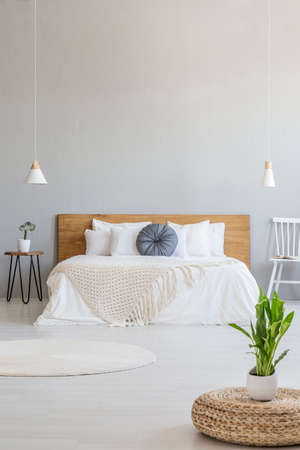Understanding Feng Shui Principles
Feng Shui, an ancient Chinese practice rooted in the balance of energies, is renowned for its ability to create harmonious living environments that promote wellbeing and restful sleep. At its core, Feng Shui emphasises the importance of flow—how energy, or “chi”, moves through a space, influencing everything from our health to our state of mind. While these principles have their origins in the East, their wisdom can be beautifully adapted to suit British homes, which often combine historical charm with modern sensibilities. In the context of UK bedrooms, where limited space and unique architectural features are common, integrating Feng Shui means more than simply rearranging furniture; it involves a thoughtful decluttering process that respects both tradition and contemporary lifestyles. By embracing these time-honoured concepts, British homeowners can cultivate bedrooms that not only reflect their personal style but also serve as sanctuaries for restorative sleep.
2. Common Bedroom Clutter in British Living Spaces
In many British households, bedrooms often become a repository for a surprising array of clutter, subtly impacting the serenity and restorative power of these personal sanctuaries. The unique character of UK living spaces—where period properties and compact city flats are common—means storage can be limited, leading to an accumulation of belongings that easily encroach on restful environments.
Main Sources of Bedroom Clutter in the UK
Understanding what typically clutters British bedrooms is the first step toward creating a harmonious, sleep-friendly space as recommended by Feng Shui principles. Below is a table highlighting frequent culprits:
| Clutter Source | Description | Impact on Sleep |
|---|---|---|
| Overstuffed Wardrobes | Bulging with unworn clothes, shoes, and seasonal items due to lack of built-in storage | Creates visual chaos and restricts airflow, fostering stagnant energy |
| Sentimental Keepsakes | Photo albums, childhood toys, inherited trinkets displayed or boxed under beds | Triggers nostalgia or emotional unrest before sleep |
| Bedding Overflow | Piles of spare duvets and pillows stored at the foot of the bed or on chairs | Makes the room feel cramped and uninviting |
| Books and Magazines | Stacks on bedside tables or windowsills from a love of reading | Distracts the mind and can gather dust, affecting air quality |
| Unsorted Paperwork & Electronics | Bills, chargers, and devices left scattered due to multi-use rooms | Adds mental clutter and electromagnetic disturbance near sleeping areas |
The Subtle Impact on Restfulness
While many of these items are part and parcel of daily British life, their unchecked presence invites a sense of disorder that can unconsciously disrupt relaxation. According to Feng Shui wisdom, clutter blocks the natural flow of energy (or ‘qi’), which may manifest as restless nights or morning fatigue. British homes—often filled with cherished heirlooms or clever yet crowded storage solutions—are especially susceptible to this hidden stressor. Recognising typical sources of clutter is essential for curating a bedroom that not only reflects your personal history but also nurtures deeper, more restorative sleep.

3. Decluttering with a Feng Shui Mindset
Bringing Feng Shui into your bedroom decluttering routine blends ancient wisdom with modern British practicality. Here’s a step-by-step guide to help you sort, organise, and release unnecessary items while respecting both tradition and the realities of everyday life in the UK.
Step 1: Set Your Intention
Begin by clarifying your purpose: better sleep, more harmony, or simply less clutter. This intention acts as your compass, guiding each decision and echoing the mindful approach central to Feng Shui.
Step 2: Survey Your Space
Take a careful look around your bedroom. Notice which areas feel cramped or stagnant—these are likely zones where energy (or “chi”) is blocked. In many British homes, alcoves or under-bed storage are common trouble spots that can accumulate clutter unnoticed.
Step 3: Sort Methodically
Tune into Energy
With each item, ask yourself if it brings you comfort or joy. Objects that stir up negative memories or simply gather dust disrupt the flow of positive energy. Place items into three piles: keep, donate/recycle, and bin. Be honest but gentle—Feng Shui encourages respect for your belongings and their stories.
Embrace British Practicality
Feng Shui values both beauty and function. Keep practical items like extra bedding or books you love, but avoid storing them under the bed—a classic Feng Shui no-no due to its impact on restful sleep. Instead, use neat baskets or wardrobes, making use of space without overfilling it.
Step 4: Organise with Purpose
Create Calm Zones
Arrange your essentials so that the area around your bed remains serene and clear. In traditional Feng Shui, symmetry is soothing—so consider matching bedside tables or balanced lighting if possible. For smaller British bedrooms, wall shelves can maximise space while keeping surfaces tidy.
Let Go Gracefully
As you release what no longer serves you, thank these items for their role in your life—a respectful nod to both Eastern tradition and the British value of appreciation for well-loved things. Donate usable goods to local charity shops, supporting community sustainability in true British fashion.
Step 5: Refresh and Reset
Finish by opening a window—even briefly—to invite fresh air and revitalise the room’s energy. With clutter gone and intention set, your bedroom transforms into a sanctuary where both body and spirit can rest more deeply each night.
4. Furniture Placement for Harmony and Rest
Arranging your bedroom furniture with Feng Shui principles not only enhances the aesthetic appeal but also cultivates a restful environment—something every British home deserves. The layout of UK bedrooms, from charming Victorian terraces to modern flats, often presents unique challenges such as limited space or quirky alcoves. Here’s how you can thoughtfully position beds, wardrobes, and furnishings to foster harmony and improve sleep quality.
Bed Position: The Heart of Tranquility
The bed is the focal point of any bedroom, representing stability and peace. In the context of British homes:
- Commanding Position: Place your bed diagonally opposite the door but not directly in line with it. This encourages a sense of security and control over your space.
- Avoid Under Window Placement: Given that many UK houses have sash or casement windows, avoid situating the bed directly underneath to prevent draughts and energy loss.
- Headboard Against Solid Wall: For extra support and grounding, ensure the headboard rests against a sturdy wall rather than beneath sloped ceilings or floating in the middle of the room.
Wardrobes and Storage: Maximising Flow
British bedrooms are often compact, making clever storage essential. Consider these tips:
- Choose Sliding Doors: In tighter spaces, opt for wardrobes with sliding doors to maintain unobstructed pathways.
- Avoid Clutter Above Wardrobes: Keep the tops of wardrobes clear; storing items here can create oppressive energy overhead and disrupt peaceful rest.
Dressing Tables & Nightstands: Balanced Arrangement
Create symmetry on either side of the bed using matching nightstands or lamps. This balance is believed to foster harmonious relationships and a calming atmosphere. If you use a dressing table, position it so that you do not sit with your back to the door, which helps maintain awareness and ease.
Quick Reference Table: Optimal Furniture Placement in British Bedrooms
| Furniture | Recommended Placement | Feng Shui Rationale |
|---|---|---|
| Bed | Diagonal from door, headboard against solid wall | Security, support, restful sleep |
| Wardrobe | Away from bed sides, no clutter on top | Smooth energy flow, avoids oppressive feeling |
| Dressing Table | Not with back to door; near natural light if possible | Avoids vulnerability, promotes clarity |
Cherishing Your Sanctuary
No matter your bedroom’s size or style—from a Georgian townhouse in Bath to a contemporary flat in Manchester—thoughtful furniture arrangement can transform even modest spaces into serene sanctuaries. By embracing these Feng Shui strategies tailored for British homes, you invite harmony and restorative energy into your nightly retreat.
5. Incorporating British Touches into Feng Shui
While the guiding principles of Feng Shui originate from the East, there is ample opportunity to weave in elements of British charm without disturbing the flow of positive energy. To begin with, consider the use of heritage pieces—an antique writing desk or a family heirloom quilt can be harmoniously included if thoughtfully placed. According to Feng Shui, these items should not overcrowd your space; instead, let each piece breathe and become a focal point that anchors calm energy. A classic British colour palette—muted greens, blues, and creams—can echo natural tranquillity, aligning perfectly with Feng Shui’s advocacy for soothing tones.
Blending Tradition with Tranquillity
When incorporating quintessentially British décor such as floral wallpapers or tartan throws, moderation is key. Opt for subtle patterns and soft textures that do not overwhelm the senses. For example, a delicate William Morris print on cushions or curtains can add cultural resonance while still promoting restful sleep. Position these accents away from the bed’s headboard or any energetic ‘hot spots’ to maintain balanced qi.
Respecting Heritage without Hindering Flow
If you own decorative items like vintage tea sets or framed family photographs, display them on shelves or chests that do not obstruct doorways or windows—the main channels through which energy enters and circulates. Remember, in both British and Feng Shui traditions, less is often more: curate your treasures so each tells a story yet avoids visual clutter.
Cultural Sensibilities Meet Positive Energy
Finally, embrace the spirit of British cosiness by layering soft textiles—think woollen throws and plush pillows—but ensure everything has its place and purpose. Select furnishings with rounded edges, reminiscent of Georgian elegance, to soften the room’s atmosphere and allow energy to flow gently around obstacles. By thoughtfully blending British heritage with Feng Shui wisdom, you create a sanctuary that honours your roots while nurturing restorative sleep.
6. Maintaining Your Clutter-Free, Serene Bedroom
Once you have decluttered your bedroom and embraced the principles of Feng Shui, the key to enjoying lasting tranquillity lies in consistent maintenance. In British homes, where seasonal shifts and daily rituals shape our routines, it’s essential to adopt habits that keep your space restful throughout the year.
Establishing Daily Tidying Habits
Begin by dedicating a few minutes each morning and evening to restore order. Make your bed as soon as you rise—a tradition long valued in Britain for setting a positive tone. Place clothing back into wardrobes or laundry baskets rather than letting them pile up on chairs or floors. A quick dust and tidy before bedtime can work wonders, ensuring your sanctuary remains inviting and free from distractions.
Adapting to Seasonal Changes
The British climate brings distinct seasons, each with its own demands. As spring arrives, embrace a thorough “spring clean”—a cherished custom—by airing out bedding, swapping heavy winter duvets for lighter covers, and reorganising wardrobes to reflect the change in attire. In autumn, store away summer garments and declutter surfaces that may have accumulated extra items during the busier months.
Smart Storage Solutions
Utilise under-bed storage for seldom-used items and invest in baskets or decorative boxes for smaller belongings. British bedrooms, often compact, benefit from multi-functional furniture—such as ottoman beds or wall-mounted shelves—that balance practicality with aesthetics. These solutions help maintain clear surfaces while keeping essentials within reach.
Involving the Whole Household
If you share your home with family or flatmates, encourage everyone to uphold tidiness. Assign responsibilities suited to each member’s strengths; perhaps children can put away toys or books before bedtime, while adults might rotate deep cleaning duties. By fostering a collective sense of pride in your living environment, the serenity achieved through Feng Shui endures far beyond your initial decluttering efforts.
Through mindful routines and an appreciation of seasonal rhythms, British households can preserve a harmonious bedroom atmosphere—a restful retreat that supports sound sleep and overall well-being all year round.


